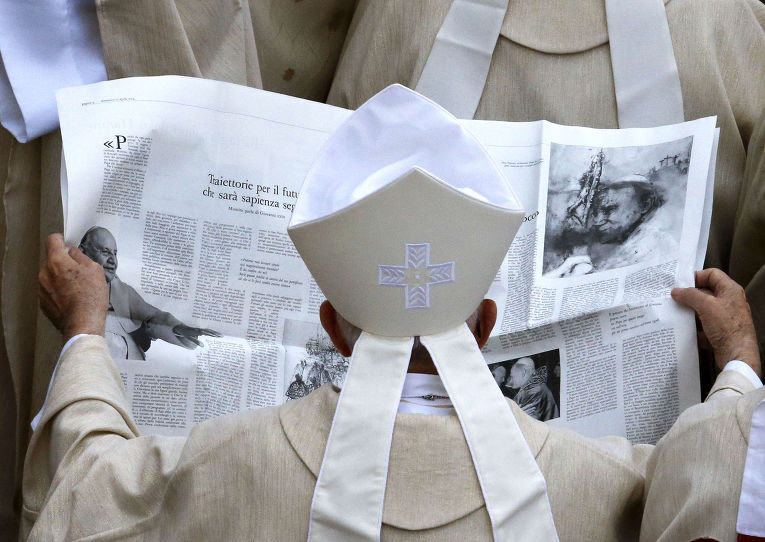|
 Газета «Наш Мир» Газета «Наш Мир»
"How can we observe the Salaat prayers by following the Quran alone?" is a favorite question among Sunni and Shiite Muslims who follow derivative texts, religious instruction, teachings and laws, all of which are written by men. With this question, both sects try to justify the necessity and proliferation of contradictory sectarian teachings, medieval Arab culture, oppressive laws filled with prohibitions and regulations--all falsely attributed to God and His prophet.
As a result, Monotheism is redefined as a "Limited Partnership", in which the recognition and submission to God alone becomes an oxymoron; a contradiction in terms in which other 'partners' are submitted to and accepted by these 'believers.' The most common set-up for Sunni shirk is: the Quran (God) + hadiths and sunnah (messenger) + the practice of the Prophet's companions + the practice of the companions of the Prophet's companions + the opinions of emams (qiyas and ijtihad) + consensus of "ulama" in a particular sect (ijma') + the comments and opinions of their students + the comments and opinions of early "ulama" + the comments and opinions of later "ulama" + the fatwas of living "ulama."
In Shiite version of shirk, in addition to the aforementioned partners, the 12 Infallible Emams (all relatives and descendants of the Prophet Muhammad starting with Ali) and the living substitute emam is added to the board of directors of the Holy Limited Partnership. The Quran is usually considered an ambigious book and is basically used for their justification of this "shirk," that is, setting partners with God. (For an extensive argument on this subject please see "19 Questions For Muslim Scholars" at http://www.moslem.org/yuksel).
Islam, which means Submission, is the state of mind of all people who submit to God alone. All messengers, Noah, Abraham, Moses, Solomon, Jesus and all previous monotheists were Submitters ( 2:131; 5:111; 7:126; 10:72,84; 22:78; 27:31,42,91; 28:53; 72:14). Thus, the only religion approved by God is Submission to God (3:19). It is God Almighty who uses this attribute to describe those who submit to His law (22:78). Islam is referred to as the "Religion of Abraham" in many verses since Meccan idol worshipers were claiming that they were following their father Abraham (2:130,135; 3:95; 4:125; 6:161; 12:37-38; 16:123; 21:73; 22:78). And Muhammad was a follower of Abraham (16:123).
Ignorant of the fact that Ibrahim observed the contact prayers (21:73), many contemporary muslims challenge God by asking where we can find the number of units in each contact prayer. Ignorant of the fact that God claimed Quran to be complete (6:11-116), they do not "see" that ALL religious practices of Submission/Monotheism were established and practiced before the Quranic revelation (8:35; 9:54; 16:123; 21:73; 22:27; 28:27). Messengers after Abraham practiced Salaat prayers, obligatory charity, and fasting (2:43; 3:43; 11:87; 19:31,59; 20:14; 28:27; 31:17).
The Meccan mushriks used to believe that they were followers of Abraham. They were not worshipping "statutes" or "icons" as claimed by hadith fabricators, but they were praying for "shafaat" (intercession) from some holy names, such as al-Lat, al-Uzza, and al-Manaat (53:19-23). So, contrary to their false assertion of being monotheists (6:23), they were accused of being "Mushrik" or associating partners to God (39:3).
Sunni and Shiite scholars subsequently fabricated stories in an attempt to erase any similarities between themselves and the mushriks, but in doing so exposed their own inherent lies in contradictory descriptions of those statutes (For instance, see Al-Kalbi's classic book on statutes: Kitab-ul Asnam). Meccan mushriks who were proud of Abraham's legend could not practice the literal observance of idol-worship; they settled for a more metaphysical satanic trap by accepting intercession and man-made religious prohibitions (6:145-150; 39:3). They were metaphysical or spiritual idol worshipers.
Meccan Mushriks, during the era of Prophet Muhammad were respecting the Sacred Masjid built by Abraham (9:19). They were practicing the contact prayers, fasting, and pilgrimage (2:183,99; 8:35the meaning of this verse is deliberately distorted in traditional translations; 9:54; 107:4-6). Although they knew Zakat (obligatory charity) they were not fulfilling their obligation (53:34). During the time of the Prophet Muhammad people knew the meaning of "Salaat", "Zakat", "Sawm", and "Hajj". They were not foreign words.
God sent the Quran in their language. As with each proceeding Book, the revelation was given in it's time, in the langauge of the people receiving the revelation. God commands and reveals in a manner which can be both understood and observed, and then He details His requirements of His people throughout His Book (16:103; 26:195). Moreover, if God wants to add a new meaning to a known word, He informs us. For instance, the Arabic word "al-din" in 1:4 is explained in 82:15-19.
Verse 16:123 is a direct proof that all religious practices in Islam were intact when Muhammad was born. Thus, he was enjoined to "follow the religion of Abraham." If I ask you to ride a bicycle, it is assumed that you know what a bicycle is and you know or learn from others how to ride it. Similarly, when God enjoined Muhammad to follow the practices of Abraham (16:123), such practices must have been well known.
Nevertheless, contrary to the popular belief, the Quran details contact prayers. While neither Quran nor hadith books contain illustration for salaat or video clips showing how the prophets observed their salat, Quran does describe prayer. The Quranic description of Salaat prayer is much more superior for the following reasons:
1. The language of the Quran is superior to the language of hadiths. Hadiths are collections of narration containing numerous different dialects and are inflicted with chronic and endemic linguistic problems. The language of the Quran is much simpler as witnessed by those who study both the Quran and hadith. The eloquence of the Quranic language is emphasized in the Quran with a repeated rhetorical question (54:17, 22, 32, 40).
2. Hadith books may contain more details. But are those details helpful and consistent with the Quran? How does a believer decide between conflicting details? Does he just pick the word of his favorite Imam? If we follow the words of a particular, favorite imam, does that meant that we are really following the practice of the prophet? For instance, you may find dozens of hadiths in Sahih Muslim narrating that the Prophet Muhammad read al-Fatiha and bowed down, without reading any additional verses from the Quran. You will find many other hadiths claiming that the Prophet read this or that chapter after al-Fatiha. There are also many conflicting hadiths regarding ablution which is the source of different rituals among sects. Hadith, more or less of them compounding God's Word with contradictory details, cannot guide to the truth. It has become a necessary evil for ignorant believers and community leaders who manipulate them.
3. Hadith books narrate a silly story regarding the times of Salaat prayer and its ordinance. The story of Mirage is one of the longest hadiths in the Bukhari. Reportedly, after getting frequent advice from Moses by going up and down between the sixth and seventh heaven, Muhammad negotiated with God to reduce the number of prayers from 50 times a day (one prayer for every 28 minutes) to 5 times a day. This hadith portrays Muhammad as a compassionate union leader saving his people from God's unmerciful and impossible demand.
SALAAT PRAYER ACCORDING TO THE QURAN
Observing Salaat prayer is frequently mentioned together with giving charity and thus emphasizing the social consciousness and communal responsibility of those who observe the prayer (2:43,83,110; 4:77; 22:78; 107:1-7).
The Salaat prayer is observed to commemorate and remember God alone (6:162; 20:14). This remembrance protects Submitters from sins and harming others (29:45). Salaat prayer should be observed continuously until death (19:31; 70:23,34).
Ablution
To observe prayer one must make ablution (4:43; 5:6). Ablution is nullified only by sexual intercourse or passing urine or defecation. Ablution remains valid even if one has passed gas, shaking hands with the opposite sex, or a woman is menstruating. A menstruating woman may observe contact prayers, contrary to superstitious cultural beliefs (5:6; 2:222; 6:114-115).
Dress Code
There is not a particular dress code for prayer, in fact, if you wish you can pray nude in your privacy. Covering our bodies is a social and cultural necessity aimed to protect ourselves from harassment, misunderstanding and undesired consequences (7:26; 24:31; 33:59).
Times For Prayer
Quran mentions three periods of time in conjunction with Salaat prayer. In other words, the Quran qualifies the word "Salaat" by three different temporal words: (1) Salaat-al Fajr (Morning Prayer), (2) Salaat-al Esha (Evening Prayer), (3) Salaat-al Wusta (Middle/Noon Prayer). The Morning Prayer (24:58) and Evening Prayer (24:58) should be observed at both ends of the day, that is, early part of the night (11:114) and the Middle Prayer (2:238). (We will discuss the times of Salaat prayers later in detail at the end of this article).
Direction For Prayer
For the prayer one must face the Sacred Masjid built by Abraham, the Ka'ba (2:125, 143-150; 22:26). To find the correct qibla a person should keep in mind that the world is a globe, far different from Mercator's flat map. Since the prayer during emergency and fear is reduced to one unit, in normal conditions the prayer should be at least two units and during the prayer one must dramatically reduce his/her contact with the external world (4:101-103). Prayers, unlike fasting, cannot be performed later after they are missed; they must be observed on time (4:103).
Congregational Prayer
Believers, men and women, once a week are invited to a particular location to pray together every Juma (Congregational) Day. They go back to their work and normal daily schedule after the Congregational Prayer which could be led by either man or a woman (62:9-11). The mosques or masjids should be dedicated to God alone, thus, the invitation should be restricted to worship God alone, and no other name should be inscribed on the walls of masjids and none other than God should be commemorated (72:18-20). Those who go to masjids should dress nicely since masjids are for public worship and meetings (7:31).
Position For Prayer
One should start the Salaat prayer in standing position (2:238; 3:39; 4:102) and should not change his/her place except during unusual circumstances, such as while riding or driving (2:239). Submission to God should be declared physically and symbolically by first bowing down and prostrating (4:102; 22:26; 38:24; 48:29). This physical ritual is not required at the times of emergencies, fear, and unusual circumstances (2:239).
Comprehension And Purpose Of Prayer
We must comprehend the meaning of our prayers, as these are the moments in which we communicate directly with God (4:43). We must be reverent during our contact prayers (23:2). Along with understanding what we say, we can recall one of God's attributes, depending on our need and condition during the time of our prayer (17:111). Prayer is to commemorate God, and God Alone (6:162; 20:14; 29:45). Prayer is to praise, exalt and remember His greatness, His Mercy and ultimately our dependence on each of these attributes (1:1-7; 20:14; 17:111; 2:45). So that even mentioning other names besides God's contradicts our love and dependence on Him (72:18; 29:45).
Recitation During the Salaat Prayer
Prefering the Quran for recitation has practical benefits since believers from all around the world can pray together without arguing on which language to chose or which translation to use. The chapter al-Fatiha (The Opening) is the only chapter which addresses God in its entirety and is an appropriate prayer for Salaat. For non-Arabs it should not be too difficult to learn the meaning of words in al-Fatiha, since it consists of seven short verses. Those who are unable to learn the meaning of al-Fatiha should pray in the language that he or she understands. I see no practical reason for reciting in Arabic during individually observed prayers.
We should recite Salaat prayers in moderate tone, and we should neither try to hide our prayers nor try to pray it in public for political or religious demonstration (17:111). If it is observed with congregation, we should listen to the recitation of the men or women who leads the prayer (7:204; 17:111). After completing the Salaat prayer, we should continue remembering God (4:103).
Units of Prayer
The Quran does not specicify any number of units for prayers. It leaves it to our discretion. The units of the Congragational Prayer being 2 is revealing, since it is more likely to be accurately preserved.
Funeral Prayer
Funeral prayers are not obligatory. They are observed to remember those who died as monotheists and to provide community support for their relatives.
Sectarian Innovations
There are many sectarian innovations that differ from sect to sect. Some of the innovations are: combining the times of prayers, performing the prayers omitted at their proper times, shortening the prayers during normal trips, adding extra prayers such as "sunnah" and "nawafil," innovating a paid cleric occupation to lead the prayers, prohibiting women from leading the prayers, while sitting reciting a prayer "at-Tahiyatu" which addresses to the Prophet Muhammad as he is alive and omnipresent, adding Muhammad's name to the Shahada, reciting zumm-us Sura (extra chapters) after the al-Fatiha, indulging in sectarian arguments on details of how to hold your hands and fingers, washing mouth and nose as elements of taking ablution, brushing the teeth with "misvak" (a dry branch of a three beaten into fibers at one end as a toothbrush) just before starting the prayers, wearing turbans or scarves to receive more credits...
HOW MANY PRAYERS A DAY?
Only three Contact Prayers are mentioned by name in the Quran. In other words, the word "salaat" is qualified with descriptive words in three instances. These are:
1. Salaat-al Fajr-DAWN PRAYER (24:58; 11:114).
2. Salaat-al Esha-EVENING PRAYER (24:58; 17:78; 11:114)
3. Salaat-al Wusta- MIDDLE PRAYER (2:238; 17:78)
All of the verses that define the times of the prayers are attributable to one of these three prayers. Now let's see the related verses:
DAWN & EVENING PRAYERS by their names:
". . . This is be to be done in three instances: before the DAWN PRAYER, at noon when you change your clothes to rest, and after the EVENING PRAYER. . ." (24:58).
For other usage of the word "esha" (evening) see: 12:16; 79:46
The times of DAWN & EVENING PRAYERS defined:
"You shall observe the contact prayers at both ends of the daylight, that is, during the adjacent hours of the night. . . " (11:114)
Traditional translators and commentators consider the last clause "zulfan minal layl" of this verse as a seperate prayer indicating to the "night" prayer. However, we consider that clause not as an addition but as an explanation of the previous ambigious clause; it explains the temporal direction of the ends of the day. The limits of "Nahar" (daylight) is marked by two distinct points: sunrise and sunset. In other words, two prayers should be observed not just after sunrise and before senset, but before sunrise and after sunset.
Furthermore, the traditional understanding runs into the problem of contradicting the practice of the very tradition it intend to promote. Traditionally, both morning and evening prayers are observed in a time period that Quranically is considered "LaYL" (night) since Layl starts from sunset and ends at sunrise. The word "Layl" in Arabic is more comprehensive than the word "night" used in English.
If the expression "tarafayin nahar" (both ends of the day) refers to morning and evening paryers which are part of "Layl" (night), then, the last clause cannot be describing another prayer time.
The time of NOON and EVENING PRAYER defined.
"You shall observe the contact prayer when the sun goes down until the darkness of the night. You shall also observe the Quran at dawn. Reading the Quran at dawn is witnessed." (17:78).
The decline of the sun can be understood either its decline from the zenith marking the start of the Noon prayer or its decline behind the horizon marking the start of the Evening prayer. There are two opposing theories regarding the purpose of the usage of "duluk" (rub) in the verse; nevertheless, either understanding will not contradict the idea of 3 times a day since both Noon and Evening prayers are accepted.
MIDDLE PRAYER (Noon)
"You shall consistently observe the contact prayers, especially the MIDDLE PRAYER, and devote yourselves totally to God." (2:238).
Verse 38:32 implies that the time of the Middle prayer ends with sunset.
We can easily understand the MIDDLE prayer as a prayer between the two other prayers mentioned by name (Dawn and Evening).
The Old Testament has at least three verses referring to Contact Prayers (Salaat) and they confirm this understanding. Though we may not trust the Biblical translations verbatim, we may not consider them as errors since both internal and external consistency of the Biblical passages regarding the Contact Prayers are striking.
"And as soon as the lad was gone, David arose out of a place toward the south, and fell on his face to the ground, and bowed himself three times: and they kissed one another, and wept one with another, until David exceeded." (1 Samuel 20:41)
"As for me, I will call upon God; and the Lord shall save me. Evening, and morning, and at noon, will I pray, and cry aloud: and he shall hear my voice." (Psalms 55:16-17) (PS: crying aloud apparently means praying with passion).
"Now when Daniel knew that the writing was signed, he went into his house; and his windows being open in his chamber toward Jerusalem, he kneeled upon his knees three times a day, and prayed, and gave thanks before his God, as he did afortime." (Daniel 6:10)
The followers of Shiite sect observe 5 prayers in 3 times: morning, noon and evening. This strange practice perhaps was the result of a historical compromise with the dominant Sunni 5-times-a-day practice.
Господь наш! Не уклони наши сердца в сторону после того, как Ты
наставил нас на прямой путь, и даруй нам милость от Себя, ведь Ты –
Дарующий! (3:8)
| 






 Газета
Газета 


